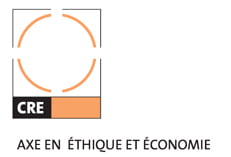
Postdoctoral fellow position “Normative aspects of monetary policy” at the Centre de recherche en éthique de l’Université de Montréal (CREUM)
In the context of his research project “National economic policy and its international economic implications” (financed by the Social Sciences and Humanities Research Council of Canada from 2013-17), Peter Dietsch is looking for a 9-month postdoctoral fellow to work on normative aspects of monetary policy, starting September 1st, 2014. The monthly stipend is C$ 3000. A background in economics and / or political philosophy is required, and working knowledge of French is an asset. The successful candidate will be associated with, and obtain a workspace at, the Centre de recherche en éthique de l’Université de Montréal. He or she will be expected to participate in the academic activities of the centre.
Monetary policy both has distributive consequences and raises questions of self-determination and monetary sovereignty in an international context. When central banks set interest rates or conduct open-market operations, should they take these considerations into account and, if so, how? More specifically, the work of the postdoctoral fellow may touch one or more of the following questions (non-exclusive list):
1) The distributive effects of national monetary policy
Inflation benefits debtors by reducing the real value of what they owe. Who benefits from low inflation combined with very low interest rates, as we have experienced in recent years? Even if a principled answer to this question might be difficult to come by because it is contingent on other policy issues like for instance the regulation of financial markets, providing some conditional answers is key to laying out the conceptual landscape of monetary policy.
2) What are the monetary policy prerogatives of the state?
When the central bank of one country changes its interest rate, the resulting effects on capital flows and its exchange rate mean that individuals in other states are also affected. Are there any obligations that the central bank of state A has towards the citizens of state B in setting its monetary policy? If so, what are they, and how should they be enforced?
3) What are the normative implications of monetary policy as crisis management?
In response to the financial crisis that started in 2008, central banks have explored unknown territory in pursuing their policy objectives. To take one important example, they have used so-called quantitative easing to promote liquidity and bank lending in a situation where interest rates could not be lowered any further. What are the economic and social implications of these policies? While this question overlaps with the previous two categories, it puts them in the specific context of the financial crisis.
Eligibility:
- Canadian candidates must have submitted their thesis before September 1st, 2014
- International applicants must have defended their thesis before September 1st, 2014, in order to meet visa requirements
Candidates should send the following documents to peter.dietsch@umontreal.ca by April 30th 2014:
- their curriculum vitae
- an article written or published over the last three years
- a text of up to 1500 words describing how their past research fits with the project
- two letters of reference (to be sent directly to the above email address before the deadline)
- an academic transcript of their PhD degree (if possible)



